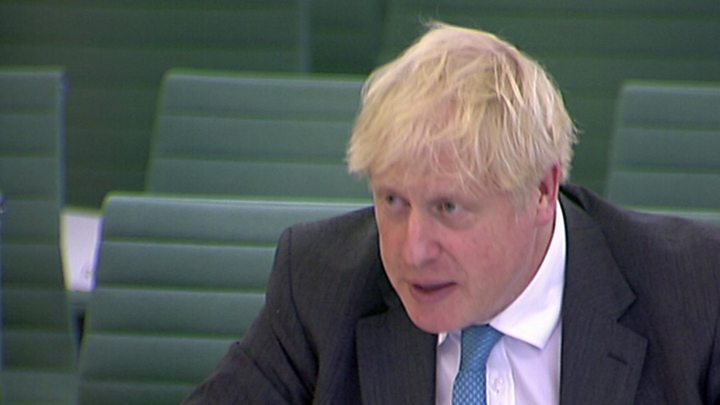
Media playback is unsupported on your device
Boris Johnson has told MPs he believes the EU may not be negotiating with the UK in good faith.
The PM was explaining why he wants to overwrite parts of the Brexit deal he signed with the EU in January.
He said it was to prevent the EU behaving in an "unreasonable" way if the UK fails to agree a trade deal.
Pressed by Labour's Hilary Benn on whether he thought the EU was negotiating in good faith, he said: "I don't believe they are."
This contradicted Northern Ireland Secretary Brandon Lewis, who earlier told MPs he believed the EU was acting in good faith.
When that was put to him, Mr Johnson said it was "always possible that I am mistaken and perhaps they will prove my suspicions wrong".
Potential rebellion
Both sides have a duty to act in good faith under Article 5 of the withdrawal agreement - but it is difficult to demonstrate a lack of "good faith" or "best endeavours" - another phrase enshrined in the treaty.
The legal definition of "good faith" is stronger than the generally accepted meaning of the words.
Mr Johnson told the Liaison Committee, a panel of senior backbench MPs, that a no-deal scenario was "not what this country wants" and "it's not what our EU friends and partners want from us".
"Therefore I have every hope and expectation that that won't be the outcome."
It comes as the PM seeks to head of a potential rebellion by Tory MPs over his plan to rewrite parts of the withdrawal agreement.
More than 30 Tory MPs were expected to vote for an amendment to the Internal Market Bill next week.
If passed, Sir Bob Neill's amendment would have given MPs the final say over changes to the withdrawal agreement which are proposed in the Internal Market Bill.
The PM has now promised to give MPs "an extra layer of Parliamentary oversight", the BBC understands.
'Belt and braces'
The BBC's political editor Laura Kuenssberg said the hope from ministers is that this will "prevent rebellion next week".
Mr Johnson says the Internal Market Bill is needed to protect the "territorial integrity" of the UK if trade talks with the EU fail.
He described it to MPs as a "belt and braces" measure in case of "extreme" interpretations of the withdrawal agreement by the EU.
The bill was "about ensuring friends and and partners don't do something unreasonable," he added.
But it has provoked a backlash from the EU, which has threatened legal action - and the possible suspension of trade talks - if it is not withdrawn.
Brandon Lewis last week admitted - in response to a Commons question from Tory MP Sir Bob Neill - that the bill would break international law in a "specific and limited" way.
His words prompted the resignation of a senior government law officer and condemnation from all five living former prime ministers, who have warned that it threatens the UK's reputation for upholding treaties and international laws.
A number of Tory MPs abstained, or voted against, the bill on Monday - and many of them were expected to back Sir Bob Neill's amendment next week.
'Legal safety net'
Writing in the I Paper, Sir Bob said his amendment "seeks to put a Parliamentary lock on the powers the government is seeking to give itself".
He added: "Taking a sledgehammer to the entire bill would be the wrong approach.
"There is a great deal of good in it, with 51 of its 54 clauses fairly innocuous for the large majority.
"However, the gravity of the three remaining clauses require, at the very least, additional checks and balances.
"My amendment would ensure further Parliamentary approval is secured before the government can discharge them."
Speaking earlier, Mr Johnson's official spokesman said the PM and his team "are in conversations with MPs about the bill and the importance of creating the legal safety net".
He confirmed that the prime minister had spoken to Sir Bob and said "conversations with MPs will continue".
What is the Internal Market Bill?
The bill sets out rules for the operation of the UK internal market - trade between England, Scotland, Wales and Northern Ireland - after the end of the Brexit transition period in January.
It proposes:
No new checks on goods moving from Northern Ireland to the rest of Great Britain Giving UK ministers powers to modify or "disapply" rules relating to the movement of goods that will come into force from 1 January if the UK and EU are unable to reach an alternative agreement through a trade deal Powers to override previously agreed obligations on state aid - government support for businesses.The bill explicitly states that these powers should apply even if they are incompatible with international law.
Ministers say the legislation is needed to prevent "damaging" tariffs on goods travelling from the rest of the UK to Northern Ireland if negotiations with the EU on a free trade agreement fail.
But some senior Conservatives - including former Prime Minister John Major - have warned it risks undermining the UK's reputation as an upholder of international law.
The legislation has also proved controversial with the devolved administrations, which are concerned about how the UK's "internal market" will operate post-Brexit and who will set regulations and standards.

 5 years ago
708
5 years ago
708 

